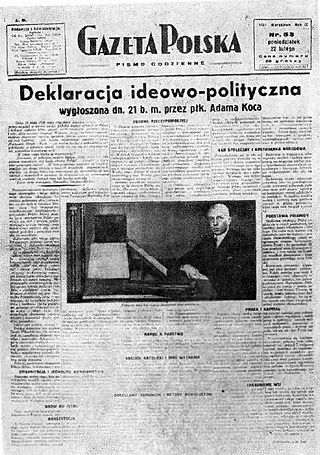Loading AI tools
Political party in Poland From Wikipedia, the free encyclopedia
Obóz Zjednoczenia Narodowego (Polish pronunciation: [ˈɔbuz zjɛdnɔˈtʂɛɲa narɔdɔˈvɛɡɔ], English: Camp of National Unity; abbreviated "OZN"; and often called "Ozon" (Polish for "ozone")) was a Polish political party founded in 1937 by sections of the leadership in the Sanation movement.
This article includes a list of general references, but it lacks sufficient corresponding inline citations. (July 2014) |
Camp of National Unity Obóz Zjednoczenia Narodowego | |
|---|---|
 | |
| Abbreviation | OZN |
| Leader | Adam Koc Stanisław Skwarczyński Zygmunt Wenda |
| Founded | 21 February 1937 |
| Dissolved | 1940s |
| Preceded by | Sanation Right |
| Headquarters | Warsaw, Poland |
| Newspaper | Gazeta Polska[1] |
| Youth wing | Union of Young Poland |
| Paramilitary wing | Obóz Polski Walczącej |
| Membership (1938) | 100,000 |
| Ideology | Polish nationalism National conservatism Economic militarism Economic nationalism Anti-communism Antisemitism |
| Political position | Right-wing |

A year after the 1935 death of Poland's Chief of State Marshal Józef Piłsudski, in mid-1936, one of his followers, Marshal Edward Rydz-Śmigły, attempted to unite the various government factions under his leadership. The attempt failed as another (opposing) Sanacja politician, President Ignacy Mościcki, likewise had a large following; nevertheless, substantial numbers of people did throw their lot in with Rydz-Śmigły.
On February 21, 1937, diplomat and Colonel Adam Koc formally announced the formation of OZN.[2] Its stated aims were to improve Poland's national defense and to safeguard the April 1935 Constitution. OZN was strongly pro-military, and its politicians sought to portray Marshal Rydz-Śmigły as Marshal Józef Piłsudski's heir, describing Rydz-Śmigły as the "second person in the country" after President Mościcki—a claim that had no foundation in the Polish Constitution. The party later went on to win the 1938 Legislative election.
OZN's first official leader was Adam Koc,[3] and its second was General Stanisław Skwarczyński. After the 1939 German invasion of Poland and the start of World War II, OZN leadership passed to Colonel Zygmunt Wenda.[3] In 1937, OZN claimed some 40,000–50,000 members; in 1938, 100,000.
During World War II and the German occupation of Poland, OZN's underground military arm, created in 1942, was known as Obóz Polski Walczącej (the Camp of Fighting Poland).
Seamless Wikipedia browsing. On steroids.
Every time you click a link to Wikipedia, Wiktionary or Wikiquote in your browser's search results, it will show the modern Wikiwand interface.
Wikiwand extension is a five stars, simple, with minimum permission required to keep your browsing private, safe and transparent.